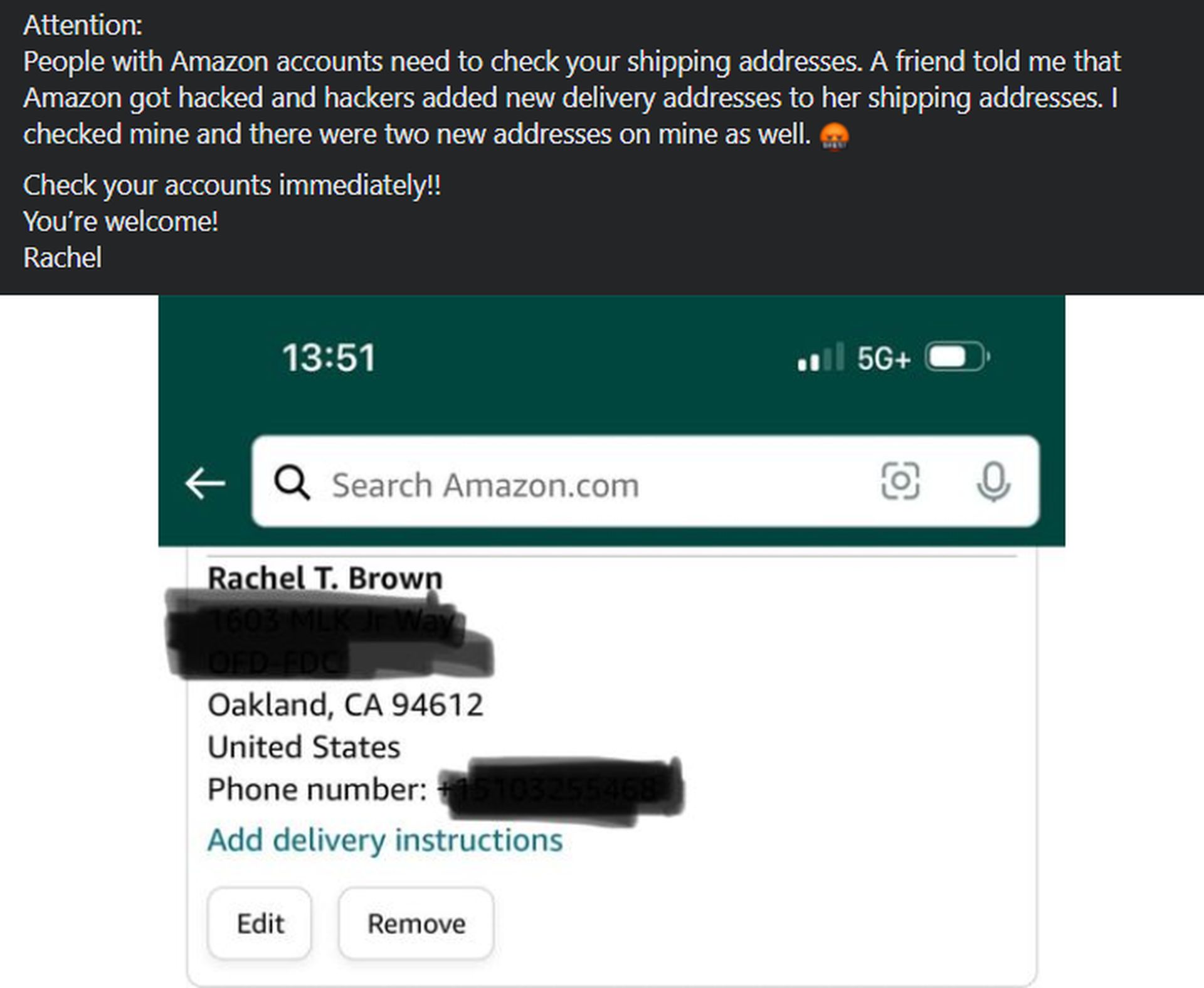One such digital tempest hit social media platforms in early December 2023, with users frantically sharing ominous warnings that “Amazon hacked.” Allegedly, criminals had infiltrated the e-commerce giant, adding fake locker addresses to unsuspecting users’ accounts, leaving a trail of potential chaos in their wake. Here is what the Amazon hacked warning says:
“PSA: check your saved addresses on Amazon. Amazon got hacked and a lot of people (including me) have random “Amazon lockers” saved in their addresses – which are not actual lockers. If you do use Amazon lockers, be sure to verify that the locker you’re sending it to an actual locker.
Double check your order history and make sure there aren’t any orders you don’t recognize. And check your bank accounts to make sure your credit card on file is also not being used for unauthorized purchases.”
As the news rippled through the digital landscape, fear and uncertainty followed suit. However, amid the uproar, it becomes crucial to dissect the sensationalism from reality.
Is Amazon hacked news true?
The claim that “Amazon hacked” circulated as a viral rumor on social media, particularly on Facebook, in early December 2023. The rumor suggested that criminals had compromised Amazon user accounts by adding fake locker addresses labeled Amazon Locker, Amazon Hub Locker, Amazon Fresh, or Amazon Counter. According to the circulating posts, these fake addresses could potentially allow criminals to order products and have them delivered at the expense of innocent Amazon users.

Users were urged to check their saved addresses on Amazon, specifically looking for any unauthorized “Amazon lockers” in their accounts. The warning also advised users to double-check their order history for any unrecognized purchases and monitor their bank accounts for unauthorized credit card charges.
In response to the widespread concern, Amazon’s global media relations spokesperson, Montana MacLachlan, issued a statement denying any evidence of a security event at Amazon. The company asserted that its systems remained secure and encouraged customers with account-related questions to contact customer service.
“We have no evidence of a security event at Amazon and our systems remain secure. Customers who have questions about their account should contact customer service.”
-Montana MacLachlan, Amazon’s global media relations spokesperson to the Snopes
Upon investigation, it was discovered that misunderstandings may have fueled the panic. Screenshots shared by users claiming to have fake Amazon pickup addresses in their accounts turned out to be legitimate and trustworthy pickup locations. Some users had incorrectly labeled these addresses as “not actual lockers.”

While the viral rumor created a wave of concern, there was a lack of concrete evidence supporting the claim that criminals were exploiting these addresses for unauthorized purchases. The situation raised questions about the accuracy of Amazon’s system in automatically suggesting pickup alternatives, especially when users reported addresses from different U.S. states appearing in their accounts.
Despite the uncertainty surrounding the origin of the added addresses, Amazon advised users to remain vigilant about their digital security. The company recommended changing passwords regularly and enabling two-step verification for an additional layer of account protection.
In summary, the Amazon hacked news turned out to be a viral rumor with no substantial evidence of a security breach at Amazon. The situation highlighted the importance of discerning information on social media and maintaining good cybersecurity practices in the digital age.
Users seek justice with 23andMe data breach class-action lawsuit
Are you still hesitating?
If you’ve come across the news about the rumored Amazon hack and want to do something for your security, here are some steps you can consider taking to ensure the security of your Amazon account and personal information:
- Check your Amazon Account: Log in to your Amazon account and review your saved addresses. Look for any unfamiliar or suspicious addresses, especially those labeled as Amazon Locker, Amazon Hub Locker, Amazon Fresh, or Amazon Counter. Remove any addresses that you did not add or recognize.
- Review order history: Examine your order history for any purchases you don’t recognize. If you find any unauthorized orders, report them to Amazon immediately.
- Monitor bank statements: Check your bank or credit card statements for any unauthorized charges related to Amazon purchases. Report any suspicious transactions to your bank and follow their recommended procedures.
- Contact Amazon Customer Service: If you have concerns about your account security or if you find anything suspicious, reach out to Amazon Customer Service. Amazon’s customer service can provide assistance and guidance on securing your account.
- Enable two-step verification: Enhance the security of your Amazon account by enabling two-step verification. This additional layer of security typically involves receiving a code on your mobile device that you’ll need to enter along with your password when logging in.
- Change your password: Consider changing your Amazon password to a strong and unique one. Avoid using the same password across multiple online accounts.
- Stay informed: Keep an eye on official statements from Amazon regarding the alleged hack. Stay informed about security best practices and be cautious about sharing sensitive information online.
- Educate yourself: Understand the nature of online rumors and hoaxes. Verify information before reacting to social media posts, and rely on official statements from reputable sources.
Understand the nature of online rumors and hoaxes. Verify information before reacting to social media posts, and rely on official statements from reputable sources.
Remember that, according to Amazon’s official statement, there is no evidence of a security event at Amazon, and their systems remain secure. However, taking proactive steps to secure your account and personal information is always a good practice in the digital age. If you have specific concerns or questions, reaching out to Amazon’s customer service for personalized assistance is advisable.
Featured image credit: Nik/Unsplash
- SEO Powered Content & PR Distribution. Get Amplified Today.
- PlatoData.Network Vertical Generative Ai. Empower Yourself. Access Here.
- PlatoAiStream. Web3 Intelligence. Knowledge Amplified. Access Here.
- PlatoESG. Carbon, CleanTech, Energy, Environment, Solar, Waste Management. Access Here.
- PlatoHealth. Biotech and Clinical Trials Intelligence. Access Here.
- Source: https://dataconomy.com/2023/12/08/amazon-hacked-news-rumor/



